By Vince Hempsall
Having spent a year of my life bicycling through New Zealand, I can speak from experience that you need good gear to get around. The country is like a mini-Canada with high mountains, rugged coastlines, cold snowstorms, and warm, sandy beaches. And they’re all packed into two islands totalling half the size of Manitoba. Given these extreme weather variances in such a small area, it’s no wonder some excellent apparel companies have come out of the country including Icebreaker and Cactus Outdoor. The founder of the latter joined us for the latest Speaker Series and delivered a talk titled, “Deliver or Don’t Bother: Why Meeting Your Product Promise Is the New Non-Negotiable.”
What began as three New Zealand climbers sewing gear in a bedroom has become one of the Southern Hemisphere’s most respected workwear and outdoor brands. Ben Kepes co-founded Cactus Outdoor in 1992 because, “Frankly, we were kind of unemployable in the real world. We wanted to make some good stuff for ourselves and our friends.” That simple goal birthed Cactus, whose early chalk bags and packs were stitched by hand under the eye of a textile-artist mom. Today, the three founders still own the company and have never had a large corporation swoop in to take it off their hands for a large sum of money. “Traditional business press would say that’s a failure,” Kepes said during his presentation. “I don’t see it that way. The fact that we can be doing what we do, holding the line 33 years later, is an amazing, beautiful thing.” Here are other key points from his talk.
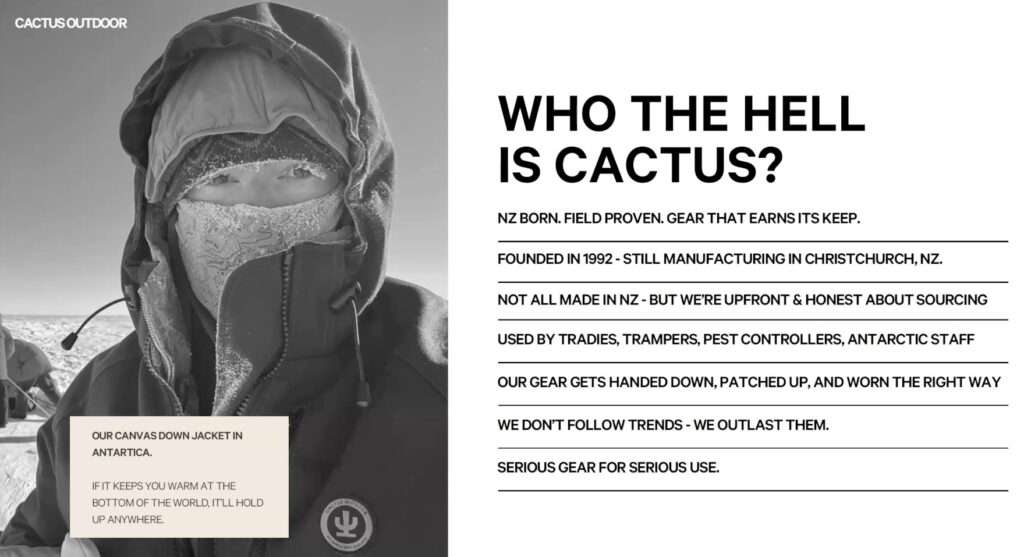
Valuing Authenticity Over Scale & Tools Over Trends
From the outset, Cactus defined itself by what it wouldn’t do. “Small brands like ours, and like what a lot of you folks do, are really important and do something that the bigger brands can’t do: we have a level of authenticity that others can’t manufacture, no matter what they do,” Kepes told the KORE audience. However, when it came time to the hard decision about moving some of the company’s production offshore, Kepes admitted to having to change his tune. “I was always vehemently pro-New Zealand-made. I said I would die if we had to move offshore. I haven’t died, but we have moved offshore.” The difference, he said, was honesty: “When we made the move, we were very, very open with our customers about the whys and the whats.” Today, the company produces 60 to 70% of its product in New Zealand and the rest offshore.
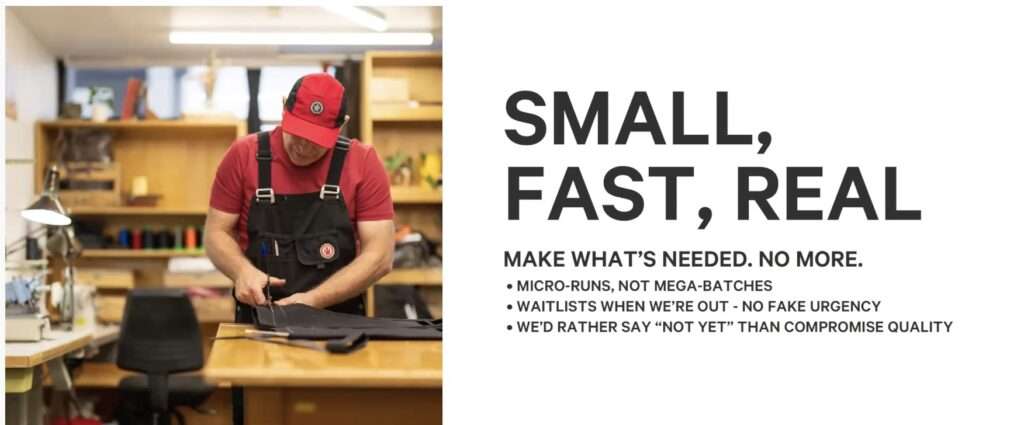
Another thing Ben and the company values is creating tools, not chasing trends. “We don’t do trends, we don’t do seasons, we don’t do new designs for the sake of new designs,” he said. As an example, their flagship Supertrousers have remained essentially unchanged for two decades. This stems from the fact the company focuses on performance and repairability over fashion or weight savings. “We’re not about ultra-lightweight fabrics,” Kepes explained. “We are serious tools for serious use. Everything we do has to last a very long time. Generally, it’s simpler and heavier than equivalents, but that’s what folks want.”
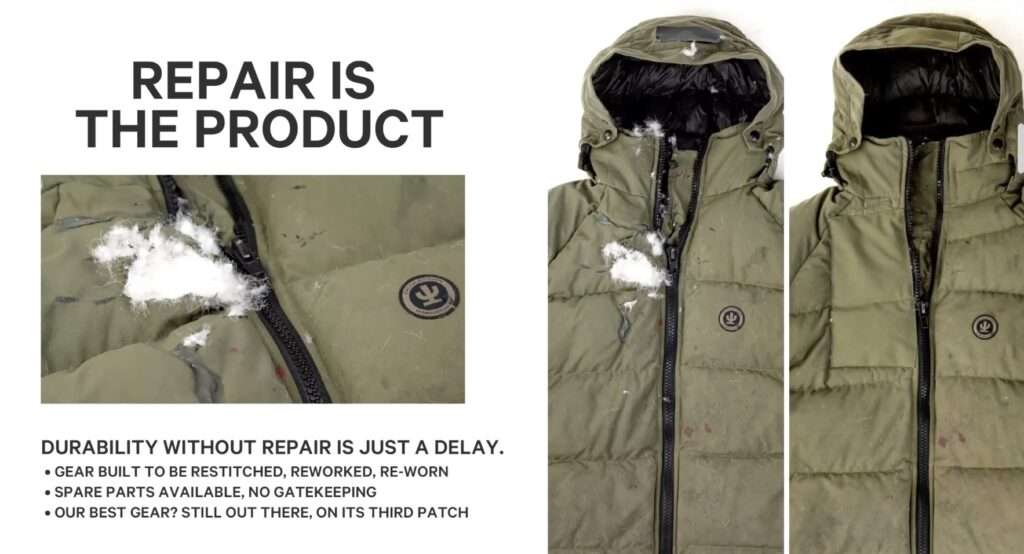
Design for Repair & Circularity
If one of their products does need repair, it’s not a problem because “We design repairability into our products,” Ben said. “Generally speaking, our stuff is much easier to repair than other products.” To wit: every Cactus store has a sewing machine on site so staff can perform on-the-spot mends. And each fix that’s made informs design improvements. “Rob, who runs our repair lab, will come running upstairs and say, ‘I’ve had this repair, and if we move this seam to here, it would make it last that little bit longer.’ So we do those tweaks.”
This approach pre-dated today’s sustainability buzzwords because Ben and his co-founders all dislike shopping. “We hate the idea of throwing something away,” he said, “Not necessarily because of the environmental aspect, although that’s important, but because it’s just stupid. We don’t want to take time to buy things; we want to have more time to do the things that we do.”
Cactus also upcycles worn gear into new items such as turning old rain jackets into caps, for instance. But Kepes ranked recycling a “very, very distant third” to repair and reuse. “It’s far better to make a pair of pants that lasts twenty years than a pair that lasts a year but can be recycled.”
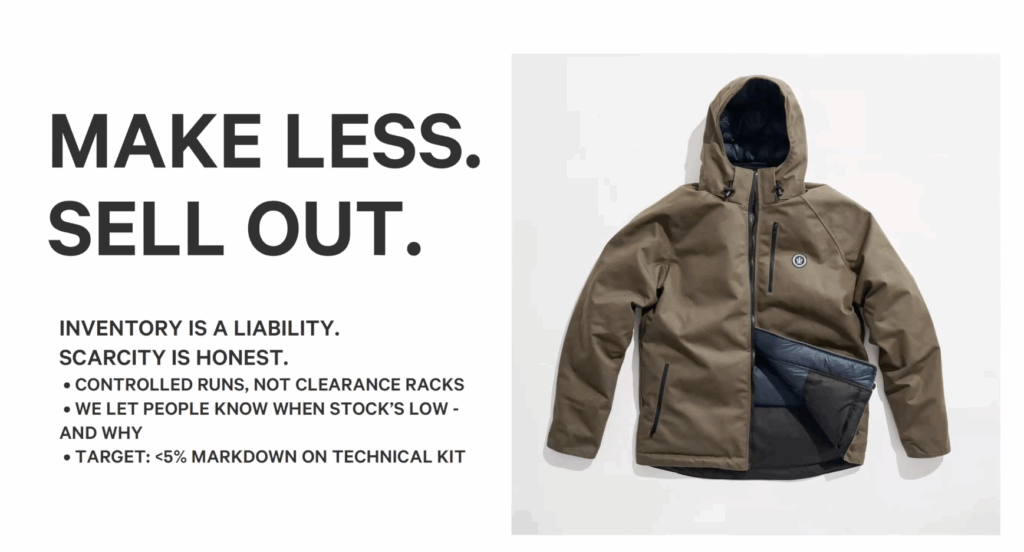
Radical Transparency & Slow Growth
Kepes is equally outspoken about pricing ethics. When Cactus raised the price of its canvas down jacket, he laid out the numbers to his customers. “It takes ten hours by our craftspeople to make. We did a blog post and advertising to be very honest about why a product costs as much as it does: how much margin isn’t being made, how many hours it takes to make.” The public appreciated the honesty. “People really responded well to that,” Kepes noted. Later, the team printed a T-shirt showing the cost breakdown of materials, labour, and margin. “People really want to feel true value,” he said. “More and more people want to understand the direct connection between what something costs to make and the value it delivers.”
It’s this honest relationship to pricing that has allowed Cactus to remain privately owned and debt-free for three decades. “We are the epitome of slow growth,” Kepes said. “It isn’t sexy, it isn’t particularly lucrative, but it gives you the autonomy to do the right stuff.” That autonomy allows him to steer the company by values rather than venture capital. It allows Ben and his co-owners to maximize the longevity of their products, and their brand, instead of maximizing profit or unit sales. And that has resulted in his two sons, who are now in their twenties, running much of the day-to-day business. It’s not about nepotism, he said, it’s about providing a future of options for everyone involved in the company.
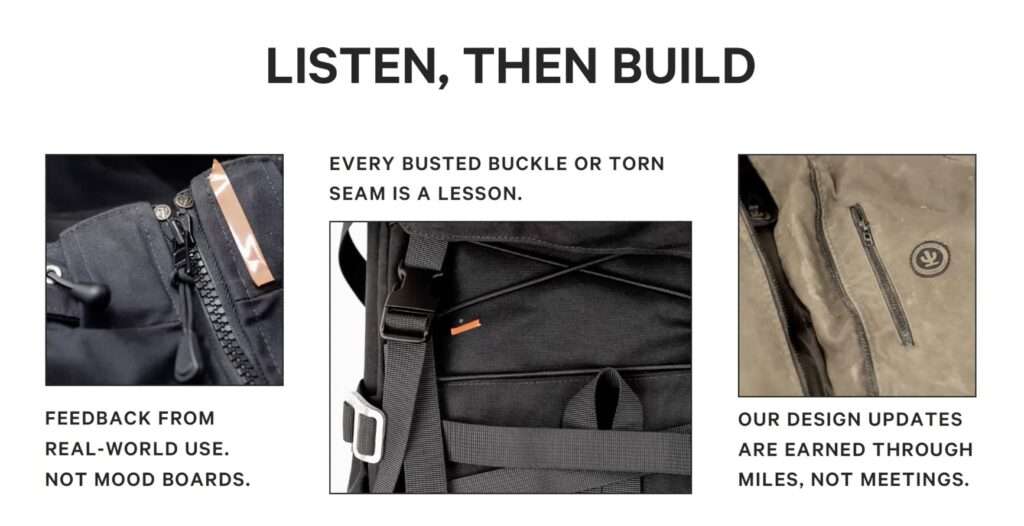
The Future of Connection
When asked whether New Zealand is experiencing a “Buy Local” movement, similar to what Canada has seen after the US Tariff hikes, Kepes urged caution. “Everyone says they love New Zealand-made, but no one actually cares,” he said. “People want you to deliver upon a promise—and that promise is about longevity and repairability. Where it’s actually made is secondary.” Plus, people shouldn’t be guilted into buying local. “I’d much rather a positive sale,” Ben continued. “Buy this product because it’s the best product out there. Our message is one of crafting and engineering, rather than specifically crafting and engineering in a certain place.”
That said, community matters and Cactus has spent three decades growing theirs. Even as the company expands abroad, Kepes insisted that their growth will never come at the cost of their community. “It’s less about where we engage people and more about how and what we engage them about,” he said.
Looking ahead, Kepes hopes Cactus will still be family-run but never complacent. “We need to grow sustainably,” he said. “We have an obligation to nurture what we’ve built so that in 20, 30, 40 years’ time, people will still be able to buy a Cactus product and continue this movement we’re started.”
KORE Outdoors gratefully acknowledges the financial support of the Province of British Columbia.

